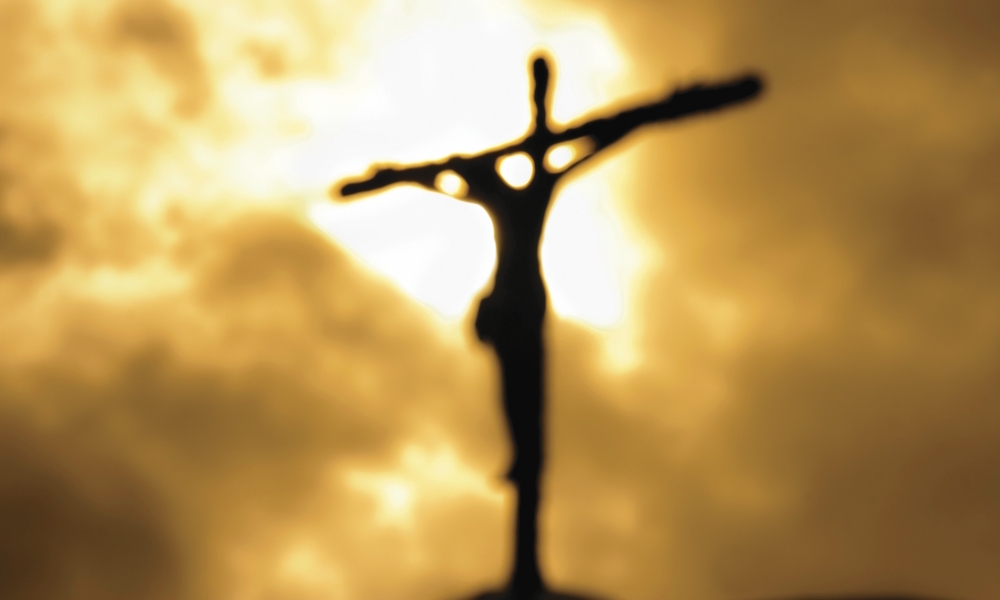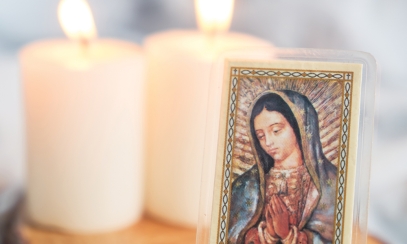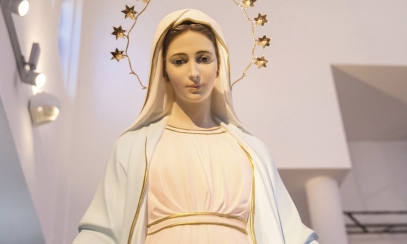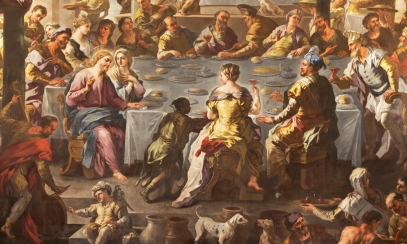
Rainbows and snakes: Lies that distort our view of God
It is interesting that Jesus calls the devil “the father of lies.” (Jn. 8:44) Another name for the enemy is Lucifer, which means “light-bearer.” Both names are, of course, interwoven, and provide us with two caution lights in our Christian journey — to be on the lookout for both false “lights” and subtle lies — not only lies about ourselves and our own identity, but especially falsehoods about God.
It is interesting that Jesus calls the devil “the father of lies.” (Jn. 8:44) Another name for the enemy is Lucifer, which means “light-bearer.” Both names are, of course, interwoven, and provide us with two caution lights in our Christian journey — to be on the lookout for both false “lights” and subtle lies — not only lies about ourselves and our own identity, but especially falsehoods about God.
The false light of New Age spirituality
One reason The DaVinci Code was so popular is that it included a section that assured the reader that they were accessing “secret knowledge” about Christ. Namely, the book promoted the ancient blasphemous lie that Jesus actually married Mary Magdalene and their descendants are now found around the globe. The tendency to attract people by promising knowledge not known by the general population is highly seductive. It was core to the early heresy of Gnosticism which the Church condemned. And it is core to the most recent repackaging of Gnosticism: New Age spirituality.
An author who was previously caught up in the New Age movement wrote about a prophetic dream she had. In the dream, she was gazing at an incredibly beautiful rainbow when suddenly someone took her by the hand. She realized it was Jesus, and he took her behind the rainbow. All she could see were snakes. The dream shook her so deeply that she returned to the Christian faith, leaving behind her New Age practices. The New Age often incorporates things like Reiki, channeling, Ouija boards, crystals or pyramids used for “empowering,” psychics, fortune telling, horoscopes, Tarot card readings, astral traveling and surrendering to “spirit guides.” So many well-intentioned people do not understand that these things can open the door to the enemy’s attacks on themselves and their families; these things go against God’s first commandment, to worship and serve him alone, which includes trusting in his providential love.
One New Age author who is quite influential is Eckhart Tolle. Tolle has some good suggestions – not to let ourselves be led by our selfish egos, for instance. But he also criticizes any religion that makes truth claims, especially Catholicism. Jesus, of course – the Church’s divine founder – made several truth claims, such as: “I am the way and the truth and the life. No one comes to the Father except through me.” (Jn. 14:6) New Age leaders such as Tolle – perhaps with noble intentions – tend to deny the uniqueness of Christ and Christianity and find statements such as this one from St. Paul lacking in inclusivity and too judgmental regarding other religions: “For there is one God. There is also one mediator between God and the human race, Christ Jesus.” (1 Tim. 2:5)
The New Age draws on concepts from paganism and certain Eastern religions. As John Shea notes in his article, “The Church and the New Age Movement”: “The New Age does not believe in a God who transcends His creation, does not believe in good or evil, has no room for judgment or blame, and holds that belief in evil is negative and causes only fear. It also fails to distinguish between God who created the universe and the universe He has created.” The next time we hear a person invoke “the universe” rather than God, we would do well to pray for them since they have likely been influenced by New Age spirituality, which is often quite subtle and seductive.
False interpretations of Scripture that distort our view of God
Many people misunderstand God because they lack a solid interpretation of certain biblical passages. Ven. Archbishop Fulton Sheen used to say that an infallible book without an infallible interpreter is a rather worthless book. Catholics are blessed with a Jesus-appointed teaching authority to help us know the correct interpretation of Sacred Scripture. This living teaching authority, comprised of the successor of St. Peter (the pope) and the successors of the other apostles (Catholic bishops), is called the Magisterium. And when the Magisterium definitively teaches about faith and morals, it enjoys the protection of the Holy Spirit from error. The Church did not invent this dogma, which is called infallibility; it is based on Jesus’ promise when he founded the Church on Peter that “the gates of hell” would not prevail against the Church. (Mt. 16:18) For Catholics, this gift of infallibility should call us not to prideful gloating, but to humble gratitude. So, based on the official teachings of the Catholic Church, let’s look at three common misinterpretations of biblical passages that lead to distorted thinking about God.
Myth 1: “If God is indeed ‘a jealous God,’ then God has a character flaw!
Through no fault of their own, many people did not get a good explanation of the Old Testament passages about God being “a jealous God.” God is not jealous of us, of course. And certainly, God has no flaws. The Catholic Church uses a technical term for moments in Scripture when the sacred author attributes merely human characteristics to God in an attempt to capture some true aspect of his divinity. This literary device is called an anthropomorphism – and the Bible is filled with them! So, what does the sacred author mean by calling God “jealous”? It means that, because he is infinite love, God does not want us to make the mistake of replacing his love with an idol — whether it be a golden calf, money, sensual pleasure or fame. It is out of love and for love, therefore, that God is – in a human way of speaking – “jealous.” He does not want our hearts to be captured by any other love except his own infinite love.
Myth 2: “God is not worthy to be followed because the Bible says he is full of wrath.”
No child likes it when a parent shows extreme anger. Yet sacred authors like St. Paul warn us: “Let no one deceive you with empty arguments, for because of these things the wrath of God is coming upon the disobedient.” (Eph. 5:6) Catholic teaching is clear that God is perfect, uncreated spirit, and therefore cannot actually experience emotions as we humans do. The footnote on this truth is that the second person of the Holy Trinity did take on a human body and a human will in the womb of his mother, Mary – so although in his personhood he is the eternal Son, Jesus was able to experience emotions in his humanity. He wept in sorrow at the tomb of his friend, Lazarus, and he showed just anger at the moneychangers who were turning God’s holy temple into a place of business.
When the Bible speaks of “the wrath of God,” it is yet another case of an anthropomorphism. But when Jesus angrily turns over the table of the moneychangers, it is not an anthropomorphism. Jesus’ holy anger is real, but he can only experience that emotion because of his humanity. Emotions require a body, not just a spirit…or in the case of us human beings, a spiritual soul. Our soul is our spirit, and vice versa.
What exactly is meant, therefore, when we read about God’s “wrath” in Sacred Scripture? The word in this case again points to the reality that God is love. The Holy Trinity is an eternal community of perfect love, and God calls us to take our place in his perfect love — not only in heaven but here on earth through our baptism and by living in God’s friendship. God “wills our good for our own sake” – which is the deepest definition of authentic love. Part of willing our good is God’s wanting us not to sin, because sin can lessen or even destroy our loving communion with him. It is in this sense that God is, in a very human way of speaking, “wrathful.” His “wrath” is simply his loving opposition to sin that damages our relationship with him – both now and, in the case of unrepented sin, in the life to come.
Myth 3: “At the cross, God the Father was incredibly cruel to his own Son.”
“I love Jesus, but I don’t care for his Heavenly Father…the Father was so vindictive, demanding a blood sacrifice from his Son!” My dad, who died with a strong faith in the Lord and attended a so-called “Bible church” in Buffalo, said he often ran into members of his congregation who had this unfortunate attitude toward God the Father.
This false interpretation of certain biblical passages, such as Jesus’ words from the cross, “My God, my God, why have you forsaken me?” (Mt. 27:46), is summed up by the term, “penal substitutionary atonement” (PSA). This theory, embraced by some but not all Protestant believers, maintains that on the cross, Jesus took the place of all mankind by experiencing the wrath and punishment demanded by God the Father. In other words, adherents of the PSA theory portray God the Father as making his Son pay the penalty for our sins…a penalty that Christ paid with his life to appease his bloodthirsty Father.
The Catholic Church, on the other hand, views Christ’s sacrifice on the cross through the lens of divine love, not as an appeasement of divine anger or vengeance. As we read in 1 Jn. 3:16, “The way we came to know love was that he [Jesus] laid down his life for us….” Pitting God the Father against God the Son (Jesus), as the PSA theory does, fails to honor the nature of God. God is one. There are no lone rangers in the Trinity. There is only one divine will. In lovingly willing our redemption, it is God the Father, God the Son and God the Holy Spirit together willing that Christ would lay down his life at Calvary in order to give us eternal life in God. In the end, our salvation is a matter of the Trinity’s extravagant love for us, not the satisfaction of the Father’s wrath; our salvation rests on the unbounded love that is the very definition of God.
In the end, our salvation is a matter of the Trinity’s extravagant love for us, not the satisfaction of the Father’s wrath; our salvation rests on the unbounded love that is the very definition of God.
Dr. Dan Osborn is the Diocesan Theologian and Coordinator of Permanent Diaconate Formation & Ministry for the Diocese of Saginaw.



